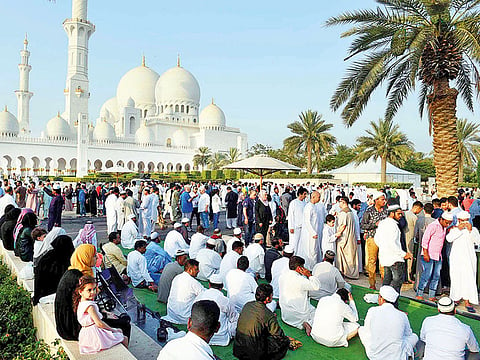UAE celebrates Eid with food and family time
Many residents use weekend break to travel overseas

Dubai: Across the UAE, residents are celebrating the joyous advent of Eid Al Fitr, which marks the completion of Ramadan. With an extended Eid weekend break — the public sector resumes work on Wednesday while the private sector does so on Tuesday — the country is steeped in the festive mood.
Over the last few days, in preparation for the long weekend ahead, tens of thousands of people have been flying to out to celebrate Eid overseas.
In Dubai alone, over 1.9 million passengers are expected to pass through Dubai International during the heightened traffic of Eid holiday. Extra staff have been deployed to cope with the rush.
In Abu Dhabi, Dr Mohammad Naeemat, Emirati, began the Eid morning with prayers at the mosque. “Eid Al Fitr is a part of our tradition, a part of our religion, and it is a very nice, celebratory occasion,” he said. “As part of the tradition, I began Eid with morning prayers at the mosque, following which, was exchanging Eid greetings. I also exchange Eid greetings with His Highness Shaikh Mohammad Bin Zayed Al Nahyan, Crown Prince of Abu Dhabi and Deputy Supreme Commander of the UAE Armed Forces. On the second day of Eid, I plan to go to Dubai to exchange Eid greetings with His Highness Shaikh Mohammad Bin Rashid Al Maktoum, Vice President and Prime Minister of the UAE and Ruler of Dubai.”
Dr Naeemat said that Eid is a great opportunity to visit family and friends. “The traditions we have are very much the same as before — of visiting each others’ homes to felicitate each other in welcoming Eid,” he said. The one difference these days, he said, is the role of technology “but during Eid, it is still customary and preferred to meet each other in person, whether it’s family, friends, or neighbours.”
For Ahmad Bin Al Shaikh, an important facet of Eid is the customary visit to his grandparents’ home. After a leisurely breakfast, the Sharjah-based Emirati family head off there. “We always visit our grandparents house because everyone gathers there,” he says.
There, the family feasts on traditional Emirati foods such as Harees, a porridge-like hot dish made with cracked wheat and meat, Balaleet, a sweet and salty omelette-style dish of sugared vermicelli and eggs, and Arsiya, a unsweetened rice pudding with chicken, served with clarified butter.
For Dubai-based Nisrin Arsiwala, an Indian expatriate, “Eid, as always, is special.” There are no extravagant plans for Eid, said Arsiwala, but her family
is planning to catch a movie “followed by a visit to relatives [that is certain].”
Arsiwala also said that the best way to spend the time off for Eid is to take a road-trip to the mountain-studded Northern Emirates.
“We will certainly make a road trip to experience the beauty of nature,” she said. “Both me and my husband love exploring the interiors of the country.”
This Eid break, the couple are planning on spending most of the time in Khor Fakkan.
Once back in Dubai, they’ll will dine out a few times. “I would love to explore some exclusive restaurants,” she added.
Mohammad Mashoud, from Bangladesh, a Dubai resident, said his Eid celebrations will be with friends in the capital. “I came from Dubai to the capital for the occasion. I started the day with the Eid prayers at the mosque, and then called my wife who is back home in Bangladesh, wishing her Eid Mubarak. I also wished my other family members back home, my father, mother, sister. It is customary to greet your family on Eid and I felt happy speaking to them.”
Mashoud said Eid is a blessed time, and he truly enjoys it. “I hope all Muslims around the world can have a peaceful and enjoyable Eid.”
For Habib Khan, a Pakistani expatriate in Abu Dhabi, Eid begins, as it does every year, with morning prayers. “The rest of the day I am spending with friends. Eid is a time of joy and celebration and I am happy to be with my friends during this holiday. It is a great time to catch up, as normally you are busy with work and daily life, so the Eid is the time to see each other. ”
Sign up for the Daily Briefing
Get the latest news and updates straight to your inbox


